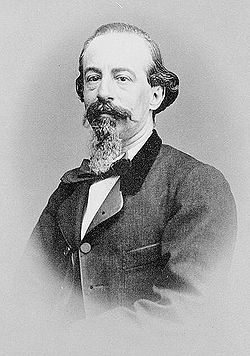José Zorrilla y Moral
| José Zorrilla | |
|---|---|
 |
|
| Born | José Zorrilla y Moral 21 February 1817 Valladolid, León, Spain |
| Died | 23 January 1893 (aged 75) Madrid, New Castile, Spain |
| Occupation | Poet, playwright |
| Language | Spanish |
| Nationality | Spanish |
| Literary movement | Romanticism |
| Notable works | Don Juan Tenorio |
José Zorrilla y Moral (Spanish pronunciation: [xoˈse θoˈriʎa]; 21 February 1817 – 23 January 1893) was a Spanish Romantic poet and dramatist.
Zorrilla was born in Valladolid to a magistrate in whom Ferdinand VII placed special confidence. He was educated by the Jesuits at the Real Seminario de Nobles in Madrid, wrote verses when he was twelve, became an enthusiastic admirer of Walter Scott and Chateaubriand, and took part in the school performances of plays by Lope de Vega and Calderón de la Barca.
In 1833 he was sent to study law at the University of Toledo, but after a year of idleness, he fled to Madrid, where he horrified the friends of his absolutist father by making violent speeches and by founding a newspaper which was promptly suppressed by the government. He narrowly escaped transportation to the Philippines, and passed the next few years in poverty.
The death of the satirist Mariano José de Larra brought Zorrilla into notice. His elegiac poem, read at Larra's funeral in February 1837, introduced him to the leading men of letters. In 1837 he published a book of verses, mostly imitations of Alphonse de Lamartine and Victor Hugo, which was so favourably received that he printed six more volumes within three years.
After collaborating with Antonio García Gutiérrez on the play Juán Dondolo (1839) Zorrilla began his individual career as a dramatist with Cada cual con su razón (1840), and during the next five years he wrote twenty-two plays, many of them extremely successful. His Cantos del trovador (1841), a collection of national legends written in verse, made Zorilla second only to José de Espronceda in popular esteem.
...
Wikipedia
